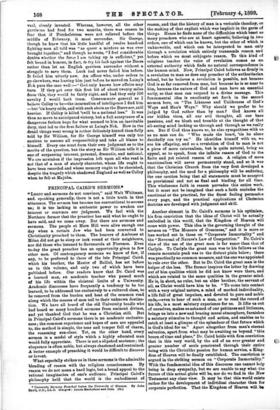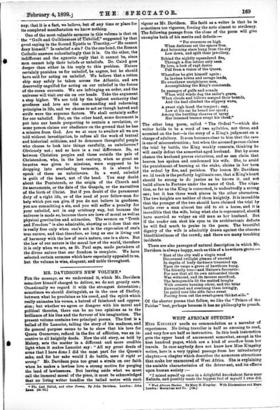PRINCIPAL CAIRD'S SERMONS.•
"Logic and sermons do not convince," said Walt Whitman, and. speaking generally, there is not a little truth in that utterance. The sermon has become too conventional to arouse us; it is too lacking in authentic power to awaken our interest or convince our judgment. We feel with the Northern farmer that the preacher has said what he ought to have said, and we come away. But there are sermons and sermons. The people at Mars Hill were alive enough one day when a certain Jew who had been converted to Christianity preached to them. The hearers of Ambrose at Milan did not go to sleep or look round at their neighbours, nor did those who listened to Savonarola at Florence. Even to-day the great preacher has an opportunity given to few other men. Of contemporary sermons we know of few, if any, to be preferred to these of the late Principal Caird. which his brother, the Master of Balliol, has set before us in this volume, and only two of which have been published before. Onr readers know that Dr. Caird was a learned man, an academic teacher who passed much of his life within the cloistral limits of a University. Academic discourses have frequently a tendency to be too learned, to be addressed too exclusively to a cultured class, to be removed from the burden and heat of the common road along which the masses of men toil to their unknown destina- tion. We have all heard of the old University beadle who had heard so many hundred sermons from eminent divines, and yet thanked God that he was a Christian still. But in Principal Caird's sermons there is no academic exclusive- ness ; the common experience and hopes of men are appealed to, the method is simple, the tone and temper full of charm, the reasoning sun-clear. Yet, on the other hand, every sermon is a model of style which a highly educated man would fully appreciate. There is not a slipshod sentence the eloquence is often noble, but always chastened and restrained. A better example of preaching it would be difficult to discover or invent.
What especially strikes us in these sermons is the admirable blending of reason with the religious consciousness. By reason we do not mean a hard logic, but a broad appeal to the rational imagination of one's audience. Principal Caird's philosophy held that the world is the embodiment of
• University Sermons Preacher", before the Univer,ity of Glasonw. By John D.D., LL.D. 01a4ow: James ItiacLehase and J01113. Le111.1
reason, and that the history of man is a veritable theodicy, or the making of that explicit which was implicit in the germ of things. Hence he finds none of the difficulties which beset so many preachers who are at heart agnostic, believing in two orders, one of which can be known, but the other of which is unknowable, and which can be interpreted to man only through a revelation which entirely transcends reason and before which we must subjugate reason. To this kind of religious teacher the voice of revelation comes as an external authority which finds no natural correspondence in the human mind. Now, Principal Caird believes as firmly in
a revelation to man as does any preacher of the authoritarian school, but he believes a revelation is possible, not because God is so far removed from man, but because ho is so near to him, because the nature of God and man have an essential unity, so that man can respond to a divine message. This fundamental idea is excellently set forth in the second sermon here, on "The Likeness and Unlikeness of God's Ways and Man's Ways." Why should we prefer to be judged by God rather than by man ? God knows all our bidden vices, all our evil thoughts, all our base passions, and we blush and tremble at the thought of that all-seeing mind looking us throngs and through as we really are. But if God thus knows as, he also sympathises with us as no man can do. " Who made the heart, 'tis he alone decidedly can try us." He identifies himself with us, we are his offspring, and so a revelation of God to man is not a piece of mere externalism, but is quite natural, being an appeal, so to speak, from the infinite reason of God to the finite and yet related reason of man. A religion of mere emotionalism will never permanently stand, and so it was that the Christian Church from the very first developed a philosophy, and the need for a philosophy will be enduring, the one caution being that all statements must be accepted as provisional and not as final and binding for all time. This wholesome faith in reason pervades this entire work, but it must not be imagined that such a faith excludes the emotional or the practical, for the finest feeling permeates every page, and the practical applications of Christian doctrine are developed with judgment and skill.
Another element in Dr. Caird's sermons is his optimism, his firm conviction that the ideas of Christ will be actually embodied in this world, that the Kingdom of Heaven will come with power. This idea is the governing thought of the sermon on "The Measure of Greatness," and it is more or less worked out in those on " Corporate Immortality " and the "Reversal of Nature's Law of Competition." Dr. Caird's view of the use of the great man is far saner than that of Carlyle. To Carlyle the great man was to his fellows as the remote mountain peak was to the distant plain below; there was practically no common measure, and the one was appointed to rale over the other. But to Dr. Caird the great man is the helper of the less. The former inspires the latter by drawing out of him qualities which he did not know were there, and which are related to the same qualities in the greater mind. He is, in short, no ruler, but an elder brother, the servant of all, as Christ would have him to be. " To come into contact with a very original nature, a mind of marked individuality, a life full of great impulses, and devoted to pure and noble ends,—even to hear of such a man, or to read the record of his life, is a most salutary experience for us. It lifts us out of ourselves, makes us ashamed of our pettiness and littleness, brings us into a new and bracing moral atmosphere, furnishes a salutary stimulus to thought and action, and enables us to catch at least a glimpse of the splendour of that future which is God's ideal for us." Apart altogether from man's eternal salvation, apart from what may be awaiting us beyond "this bourn of time and place," Dr. Caird holds with firm conviction that in this very world, by the aid of an ever greater and greater number of souls penetrated through their entire being with the Christlike passion for human service, a King- dom of Heaven will be finally established. The conviction is argued in the striking sermon on " Corporate Immortality." With the fundamental idea of this discourse one cannot help being in deep sympathy, but we are unable to say what the future of this actual globe will be, nor do we find in the New Testament any clear view. It may be that this world exists rather for the development of individual character than for corporate perfection. That the Kingdom of Heaven will be nay. that it is a fact, we believe, but of any time or place for its completed manifestation we know nothing.
One of the most valuable sermons in this volume is that on the "Guilt and Guiltlessness of Unbelief," suggested by that great saying in the Second Epistle to Timothy,—" He cannot deny himself." Is unbelief a sin ? On the one hand, the Roman Catholic answers unhesitatingly that it is. On the other, the indifferent and the agnostic reply that it cannot be, since men cannot help their beliefs or nnbeliefs. Dr. Caird goes deeper than either in his reply to this problem. Nature certainly punishes us for unbelief, be argues, but he should have said for acting on unbelief. We believe that a rotten ship may safely be taken across the Atlantic, and are deservedly engulfed for acting on our unbelief in the forces of the ocean currents. We are infringing an order, and the universe will visit our sin on our heads. Take the argument a step higher. We are told by the highest authority that goodness and love are the commanding and redeeming principles in life, and we choose to act as though hatred and strife were the supreme factors. We shall certainly suffer for our unbelief. But, on the other hand, some document is put into our hands purporting to contain a revelation, or some person claims our obedience on the ground that he has a mission from God. Are we at once to swallow all we are told without investigation, to refuse all the work of textual and historical criticism, and to denounce thoughtful people who choose to look into things carefully, as unbelievers ? Obviously not ; and so here is a real difference. So, as between Christian peoples and those outside the pale of Christendom, who, in the last century, when so great an impetus was given to missions, were supposed to be dropping into everlasting torments, it is absurd to speak of these as unbelievers. In a word, unbelief is guilt of the heart, not of the head. You may doubt about the Pentateuch, or the origin of the Church and its sacraments, or the date of the Gospels, or the narratives of the birth of Christ. But if you doubt of the paramount duty of a right life, or of the need of your fellow-man for help which you can give, if you do not believe in goodness, you are committing a sin, and you will suffer a penalty for your unbelief, not in any arbitrary way, but because the universe is made so, because there are laws of moral as well as physical gravitation and attraction. The sermon on " Truth and Freedom" is also admirable, showing as it does that one is really free only when one's act is the expression of one's true nature, and that therefore, so long as one is living out of harmony with the law of one's nature, one is a slave. But the law of our nature is the moral law of the world, therefore it is only when we are, as St. Paul says, made partakers of the divine nature that our freedom is complete. We have selected certain sermons which have especially appealed to us, but the volume is wise, eloquent, and noble throughout.



































 Previous page
Previous page